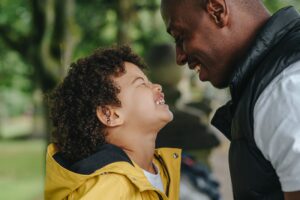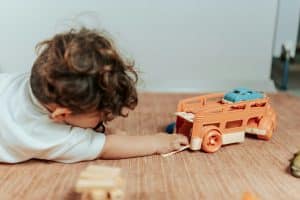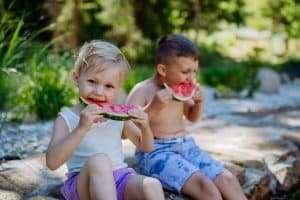The birth-to-three period is the fastest rate of brain development in the human lifespan. And what is most essential to this early brain development are interactions with adults and opportunities to explore and play. Infants are hardwired to expect care from adults; their survival depends on it. But, unlike many other mammals, humans require care from their mothers for much longer.
Early Development
Unlike other mammals, humans benefit from care from both parents! These early interactions create the building blocks that teach babies about human interactions, emotions, and communication. For example, when a newborn cries and an adult tends to their needs, whether it be sleep, feeding, a diaper change, or play.

Over time the baby uses different cries, sounds, and gestures to indicate what they need, and they learn that specific noises, gestures, and reactions produce different results. The more positive the responses, the more secure a baby feels in its environment, and the more it learns.
Learning to Play
The great thing about babies and toddlers is they don’t need much to play! Yes, countless toys are designed to stimulate your baby’s brain and build skills, but the truth is simple is often best.
Babies love interacting with faces, various textures and sounds, bright colors, and large patterns. With a few simple toys like soft blocks, rings, cloth books, and texturized toys, your little one will learn how to grasp, hold, throw, and manipulate objects.

As their fine motor skills progress, they can begin manipulating more types of toys, and play gets interesting! Once your baby can sit up on their own, roughly 6-7 months, their entire view of the world changes!
Now they can begin building with blocks, playing “catch,” driving cars and other vehicles, holding books independently, etc. Your baby also no longer needs you to respond to every call and cry immediately. Some cries will be from frustration, and it’s an excellent time to start teaching your little one to self-soothe and problem-solve!
Language & Cognitive Development Bloom!
From 6 months to 18 months, your baby’s cognitive and receptive language development will bloom quickly! This is a rapid period of brain development that is exciting to watch as a parent.
Your baby-turning toddler still relies on you for essential needs like food, diapers, sleep, and care. But they can play independently and should! This is a fantastic age of exploration.
Independent play doesn’t always mean you leave your child alone while they play. Although if they’re in a secure space like a playpen, this is an excellent opportunity to cook dinner to fold laundry. Instead, it means you allow them opportunities to problem solve and discover without you giving them the answers.

This is the age in brain development where playing with purpose really takes off! Playing with purpose means you are guiding your little one to learn specific skills through play.
For example, if you want to teach about colors, you may begin pointing out the different colors of their blocks and say, “I have a blue block, and you have a yellow one!”
Another example is If your child is trying to solve a simple puzzle or fit a shape into a shape sorter and is struggling, resist the urge to solve it for them. Instead, allow them time to struggle and try to solve it independently. If they are visibly frustrated, try helping by asking questions like, “What would happen if you turned the piece a different way?”
It goes back to the adage if you give a man a fish, and he’ll eat for a day, teach him to fish and eat for the rest of his life. When you allow your child a chance to struggle and problem-solve, they learn!
To Infinity and Beyond!
As your baby approaches their second and third birthdays, language will explode! And the more you talk and read with them, the more words they’ll know! Toddlers can understand a lot more than they can say, so don’t be afraid of using big words. Plus, if a child never hears a word, how can they possibly learn it?

From ages two to three, social and emotional skills are also developing rapidly. Children observe the adults around them and take their social cues from them, so be a role model!
Name and label emotions for toddlers to help them process what they are feeling and talk about your feelings too! It’s ok to be angry, sad, frustrated, scared, etc., so talk about it with your little one!
Two to three is also the perfect age to make screen time interactive. In our society, it is difficult for parents to avoid screen time with their toddlers altogether, and believe me, we are not judging you! But if your little one uses a screen, make it interactive by sitting and playing with them!

All our games at KneeBouncers are designed to be bonding time between you and your child so that you can enhance their learning. Talk with them about what they’re doing, seeing, and hearing! Ask questions to deepen their understanding of the games and make predictions about what might happen next!
Birth to three is an exciting time of development and learning! And the more you can foster your child’s learning through play and social interactions, the more brain development will occur!
May 10, 2023, By L. Elizabeth Forry









